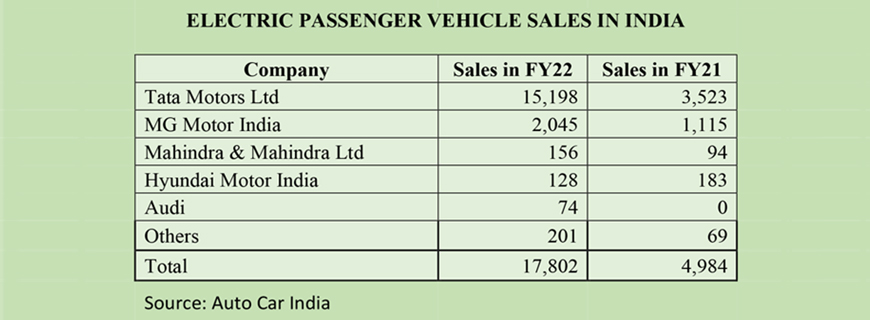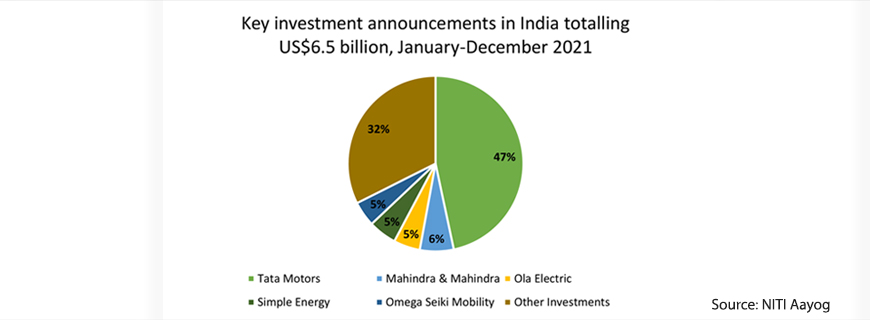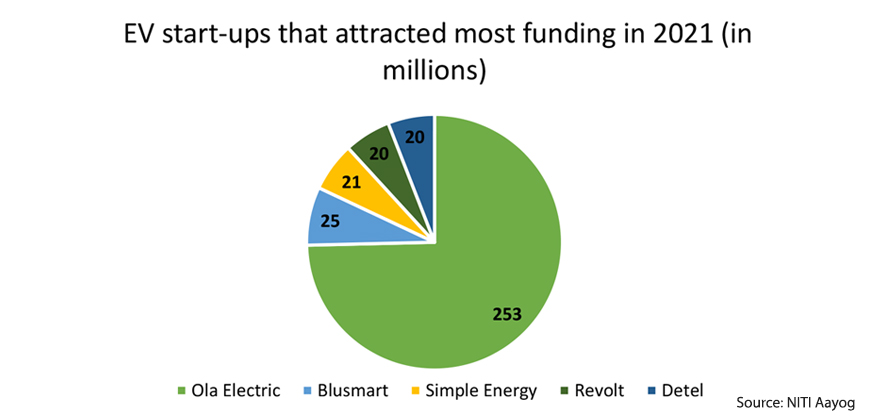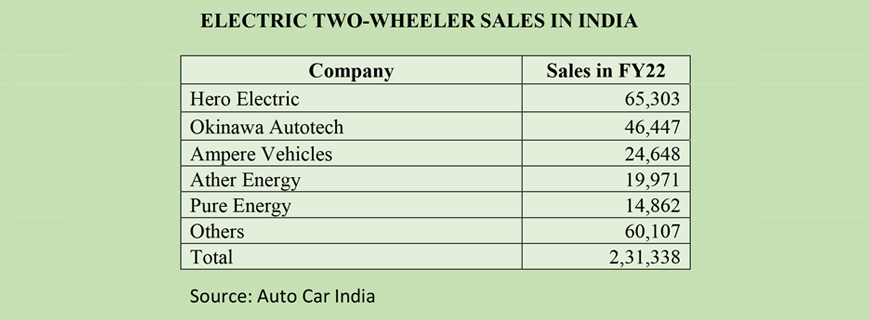India being a supporter of the EV30@30 campaign has rolled out many initiatives to support the Electric Vehicles sector. The campaign aims to achieve a 30 percent sales share for EVs by 2030 [1] As per a report released by RBSA Advisors, the Indian Electric Vehicle market is projected to grow to $150 billion by 2030, exhibiting a CAGR of 90% during the current decade.[2]
There has been a surge in the sales of EVs during FY22 which can be attributed to the increase in the availability of products in the market, high fuel prices and state subsidies. Union Transport Minister, Nitin Gadkari stated that there are 1.2 million electric vehicles in the country today and the number is expected to reach 30 million in the next two years.[3]

Tata Motors accounts for 90% of the electric car sales in the country.[5] The company aims to continue its expansion in the EV market and intends to work on nearly 10 products over the next 5 years. In order to finance its plans for the EV sector the company has raised a fund of $1 billion from private equity firm, TPG and has earmarked another $1 billion of its own money.[6]
Tata Motors is not the only company that sees the potential in the EV industry. Several companies have made announcements to invest in electric vehicles, components and battery manufacturing, EV supply equipment, research and development and deployment.

EV startups including Hero Electric, Magenta and Ola Electric have raised venture funding of nearly US$446 million for EVs, components, battery manufacturing and EVSE in 2021.[7] The rising number of EV startups in India reaffirm that electric vehicles are the future of the automotive industry. There are about 592 electric vehicle startups [8] of which around 250 are from the electric scooter segment. Ola Electric, Ather Energy, Yulu, BluSmart Mobility and Euler are some of the popular startups that have gained recognition in the market.

The electric scooter segment faces a tough competition with more than 250 players in the market.[3] A study conducted by India Ratings & Research predicts the segment to grow at a strong CAGR of 75 to 80 percent between FY22 and FY25.[9] The EV two wheeler segment sales is projected to be the highest among the different EV categories by 2030.[10]

The commercial vehicle segment too has shown a positive response to the electrification of vehicles with sales of 1,77,874 units in the three wheeler segment alone.[4] Mahindra Electric, Ashok Leyland, Tata Motors, Bajaj Auto and Piaggio Ape are some of the major companies in this segment.
In its efforts to boost the EV market, the government of India has involved both public and private agencies to set up charging stations. Some of the key Charge Point Operators are EESL, REIL, Tata Power, EVI Technologies and Charge Zone. The major Charger OEMs are Delta Electronics, Exicom Tele-Systems, ABB Ltd and Okaya Power Pvt Ltd.
The government has also provided incentives and promoted the Make in India initiative to reduce the country’s dependence on import of EV batteries. The EV battery market is expected to grow at a CAGR of 30% by 2026.[11] Exide Industries, Amara Raja Batteries, Tata Chemicals, Hero MotoCorp and Maruti Suzuki are the top manufacturers of EV batteries.
But even with the positive growth figures, financial institutions are still hesitant to lend money to EVs given their nascency. This puts EV buyers at a disadvantage as they are not able to obtain the interest rates and tenures that are available for ICE vehicles and hinders potential buyers from making a purchase. Cumulative investment in India’s EV transition could be as large as $266 billion between 2020 and 2030.[7] This highlights the need for higher liquidity and lower cost of capital for EV assets and infrastructure.
To address these issues, NITI Aayog has proposed the inclusion of EVs under RBI’s Priority Sector Lending. NITI Aayog along with the World Bank is also setting up a US$300 million first-loss-risk-sharing instrument to act as a hedging and guaranteeing mechanism for banks and NBFCs in the event of payment delays on EV loans.[7] The government has also taken a step forward by launching the Production Linked Incentive scheme worth $2.4 billion for investments in ACC battery manufacturing and worth $3.5 billion for automotive manufacturing focusing on EVs and hydrogen fuel cell vehicles. The Fame India Scheme is also a positive move towards encouraging the switch to EV.[7]
Though the initiatives taken by the government are encouraging, there are still multiple points that require attention. The lack of local supply chains for manufacturing EVs and batteries are a barrier to local manufacturing, and the lack of infrastructure with regard to the number of charging stations in the country is also quite concerning for potential buyers. Road infrastructure too has to be improved.
The Indian market presents great scope for Electric Vehicles and with the right thrust it can achieve its goals of environmental sustainability in the coming years. The EV industry provides opportunities for economic, social and environmental benefits which can help the country develop further.
REFERENCES
- https://iea.blob.core.windows.net/assets/8cbeac6e-50e5-4a50-909c-24108adaf603/CampaignDocumentupdate_2020.pdf
- https://www.businesstoday.in/latest/story/indias-ev-market-to-grow-by-90-to-touch-150-billion-by-2030-report-314116-2021-12-01
- https://www.thehindu.com/business/Industry/number-of-electric-vehicles-in-india-to-reach-3-crore-in-two-years-says-gadkari/article65390856.ece
- https://www.autocarindia.com/industry/retail-ev-sales-cross-4-lakh-units-since-april-2021-424073
- https://economictimes.indiatimes.com/industry/renewables/tata-motors-aims-to-build-80000-electric-vehicles-this-financial-year-sources/articleshow/91152750.cms?from=mdr
- https://www.businesstoday.in/auto/story/tata-motors-frugal-plan-to-raise-ev-production-331993-2022-05-02
- https://www.niti.gov.in/sites/default/files/2022-01/Banking-on-EV_web_2.0a.pdf
- https://tracxn.com/explore/Electric-Vehicles-Startups-in-India
- https://www.thehindubusinessline.com/specials/auto-focus/electric-two-wheelers-to-see-huge-uptick-in-next-2-3-years/article37029921.ece
- https://timesofindia.indiatimes.com/business/india-business/ev30-how-adequate-finances-infrastructure-can-provide-fillip-to-indias-ev-dreams/articleshow/91465087.cms
- https://www.imarcgroup.com/india-electric-vehicle-battery-market
About the Author
Akshay Sasikumar is the Managing Partner at www.82advisory.com, a firm that specializes in Capital Strategy and investment banking services for technology companies.